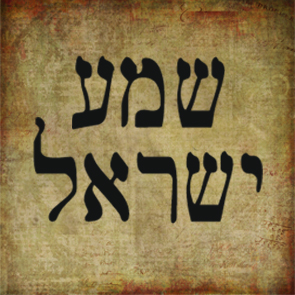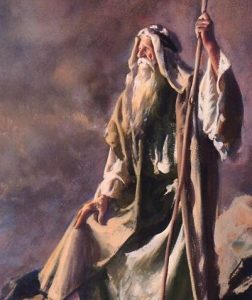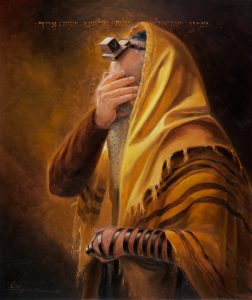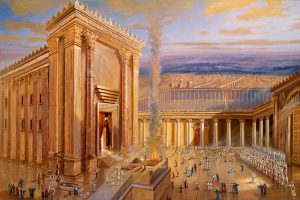Raboyseyee and Ladies:
Are the Yiddin Third-Temple Worthy?
We begin with an Oisvorfer rant. Though Tisha Be’ov is in our collective rear view mirrors, the Oisvorfer reminds you that yearly on the 9th of Ov (or one day later as the case was this year), we mourn the destruction of both Botei Mikdash, both holy Temples. The heylige Gemora (Gittin 55B) tells us the very depressing story of two gentleman named Kamtza and Bar Kamtza and a dinner party thrown by a third person. The bottom line of the story was that as a result of baseless hatred (sinas chinom) and the fact that not one of the attending rabbis intervened to prevent public embarrassment and humiliation to Bar Kamtza, a series of events unfolded leading to the destruction of the second Temple. Wow!
From time to time, the Oisvorfer ponders whether or not the Moshiach is making an appearance anytime soon. Though he recites and often sings the Ani Mamin (I believe), the one with words of hope and desire for Moshiach’s arrival, sadly, he concludes that the Moshiach is not coming, not yet anyway! At least not based on our merits which remain unchanged since the events leading to the destruction of the 2nd Temple. Oy vey!
This past shabbis, on the 9th of Av mamish, the heylige Oisvorfer was an eye witness to behavior which only solidifies this opinion. Nebech. In shul that morning, the air conditioning was on, it is after all July. Ober the room was quite cold. Everyone was cold. Everyone that is but one rather large (300 pounds large, though others argue that he weighs in at a minimum of 325-340) person who happened to be sitting just near the A/C. It was decided to ask a goy (gentile) to come in and turn off the system. The goy happily complied. Ober as he approached the large fellow, one who happens to sport a litvishe beard and unkempt payis, one who is well versed in the folios of the heylige Gemora, and others teachings, including halachic rulings, he got off his chair and yelled at the goy to leave. He yelled loudly enough that all heard; the shul went eerily quiet. Shoin, not looking for trouble -the goy did come in as a favor- and after hearing the big guy yell- the goy walked out. Ober the other Yiddin remained cold and again asked the goy to come back and turn off the system. This time, the 300 pounder yelled even louder, and told the goy azoy: “you are not shutting the A/C. In order to do that, you must get by me and you are not getting by me.” Fighting words. More was said but you get the point. Though the other Yiddin were all yelling to shut the system, the big guy was obstinate. When finally approached by another Yid who -representing the others- confronted him- he called the Yid a Nazi and worse. All were flabbergasted. The big guy went on to explain -while screaming- that he has a lung issue, he cannot breathe. Ober that same fellow breathes just fine while playing basketball, baseball, and especially while eating his daily regimen of 3500-5500 calories. Does everyone agree? Not! Some say the numbers should be adjusted upwards to 5000-7000 calories per day. Yikes!
 What happened next? After telling the big guy that the system would be shut off until the room warmed up a bit, and then turned back on, the goy was again called. He came in a third time and did unplug the A/C. It so happens that the big guy is an excellent ba’al koirah (Torah Reader) and was scheduled to lain the parsha. And taka he did. Ober did he read it in its entirety? He did not! At the 5th aliya, he promptly removed his talis and ran out of the shul. He did not return to shul, nor has he since.
What happened next? After telling the big guy that the system would be shut off until the room warmed up a bit, and then turned back on, the goy was again called. He came in a third time and did unplug the A/C. It so happens that the big guy is an excellent ba’al koirah (Torah Reader) and was scheduled to lain the parsha. And taka he did. Ober did he read it in its entirety? He did not! At the 5th aliya, he promptly removed his talis and ran out of the shul. He did not return to shul, nor has he since.
Are there laws governing the use of the air conditioner in a shul? How about the heat? Can one person control or make demands to control the system? Are there laws or responsa governing this and similar situations? Have these questions been asked and answered? Was there air conditioning when shul laws were codified? So happens that there are specific laws regarding heat during the winter, the opening and closing of a window, ober what about the A/C? The Oisvorfer knows that there are other bad guys out there who believe their own comfort -at any expense- comes first.
 Nu, absent very specific laws or responsa on this issue, we must assume that when every single person in the room is cold and but one person is warm (while seated less than one foot from the A/C , that he should, or must demur. But he did not! Instead he chose to make a scene, an ugly one at that. Instead he chose not to sanctify the RBSO’s name with decent behavior. Instead he yelled epitaphs at the one Yid who tried -on behalf of others- to get the situation under control. The big guy was clearly unhinged and out of control. Not the first time.
Nu, absent very specific laws or responsa on this issue, we must assume that when every single person in the room is cold and but one person is warm (while seated less than one foot from the A/C , that he should, or must demur. But he did not! Instead he chose to make a scene, an ugly one at that. Instead he chose not to sanctify the RBSO’s name with decent behavior. Instead he yelled epitaphs at the one Yid who tried -on behalf of others- to get the situation under control. The big guy was clearly unhinged and out of control. Not the first time.
Ober was he alone complicit? In the Kamtza and Bar Kamtza story (too long for now but a very good read in the heylige Gemora), had the rabbi, or rabbis, gotten up and told the fellow making the party not to needlessly embarrass Bar Kamtza, the second Temple may still have been standing today. So says the Gemora steadfastly and with certitude. In our shul, had the Gabbi gotten up and taken a position, an unnecessary chillul Hashem could have been avoided. He did not! And that raboyseyee, is the reason, that the Yiddin are not yet third-temple worthy. Shoin the Oisvorfer feels much better; let’s learn some parsha.
With eight full years of parsha reviews in the rear view mirror, we begin year nine today with Parshas Vo’eschanan. A very Happy Anniversary to the Oisvorfer, who began writing one Friday afternoon to but one chaver who asked for a quickie (devar Torah you chazir).Then, like it is today and every year on this parsha, it was erev Shabbis Nachamu. Today the readership exceeds hundreds of thousands in all corners of the earth.
Let’s begin with a short discussion of the Shema, six big words (eight in English) which represent the most fundamental statement in all of Judaism. The Shema prayer? And why are we beginning with the Shema? Because it, and the first (of three) paragraphs which make up the entire Shema tifillah (prayer) are found in this week’s parsha of Voes’chanan. The Shema prayer is the most well-known and widely recited Jewish prayer, yet most people recite it without a clue as to why and according to some- especially kabbalists- its many secrets.
 Efsher you’re klerring azoy: It’s taka well accepted by all Yiddin that the Shema – the six word refrain- is the most important Jewish prayer, and is perhaps the most famous of all Jewish sayings. Ober how did this come about? In the heylige Toirah, these words of Shema don’t particularly stand out, and that being the case, how is it that these words and the short straightforward paragraph that follows them, have become the ‘mission statement’ of the Yiddin and the most famous of all Jewish prayers? Moreover, though these words are certainly part of our davening and are recited several times daily, were they intended as a prayer, or, are they but a quotation from the heylige Toirah as are other words? How did the Shema become the Shema?
Efsher you’re klerring azoy: It’s taka well accepted by all Yiddin that the Shema – the six word refrain- is the most important Jewish prayer, and is perhaps the most famous of all Jewish sayings. Ober how did this come about? In the heylige Toirah, these words of Shema don’t particularly stand out, and that being the case, how is it that these words and the short straightforward paragraph that follows them, have become the ‘mission statement’ of the Yiddin and the most famous of all Jewish prayers? Moreover, though these words are certainly part of our davening and are recited several times daily, were they intended as a prayer, or, are they but a quotation from the heylige Toirah as are other words? How did the Shema become the Shema?
Nu, while the Oisvorfer is zicher no expert, one pshat goes like this. The Shema has acquired special symbolism because of historical circumstances. After the Romans conquered Yirusholayim and destroyed the Beis Hamikdash (Temple) and exiled thousands of Yiddin, there was one last attempt at freedom – a revolt led by Shimon Bar Kochba in 135 CE, with the support of Rebbe Akiva. The revolt failed, Bar Kochba was killed in battle and Akiva arrested and tortured to death in the arena. He died saying that first line of the Shema as a final act of spiritual defiance. And ever since then it is traditional for a Jew who is about to pass away to recite the Shema as his or her final words. Poshit giredt (simply stated), the Shema, for us Yiddin is a declaration of faith, and also an assertion that the RBSO is one and indivisible.
The Shema is a declaration of faith, a pledge of allegiance to the RBSO. It is said upon arising in the morning and upon going to sleep at night. It is said when praising the RBSO and when beseeching Him. It is a prayer as well as a declaration, containing the first verses taught to an infant and the final words proclaimed as life ebbs away and the soul departs. The Shema has been associated with the final defiant declaration of martyrs, but its message is primarily about life and living. And says the heylige Gemora (Menochis 99B) azoy: Said Rav Yoichonon in the name of Reb Shimon bar Yochai: One who reads Shema Yisrael morning and evening has fulfilled the injunction that “the words of this Toirah shall not move from your mouth (Yehoishua 1:3)”.
And says the heylige Gemora, azoy: when Yaakov was about to reveal the end of days (parshas Vayichi) to his children, he was concerned that one of them might be a non-believer. His sons reassured him immediately and cried out, “Shema Yisroel.” And avada you all know that Moishe included the Shema in his farewell address to the Yiddin. ‘We recite Shema when preparing to read the heylige Toirah on Shabbis and festivals. And we recite the Shema at the very end of our davening on Yom Kippur when we reach the level of angels. Shema is contained in the mezuzah we affix to the doorpost of our home, and in the tefillin that we bind to our arm and head.”
According to one interesting kabalistic approach, the Shema give us more than a hint as to the arrival of the Moshiach -may he come very speedily in our time. Next time you recite the Shema, please notice that two of its letters are extended, they are larger than the others. There is a large letter Ayin with a numerical value of 70 in the first word and a large Daled with a numerical value of 4 in the last of the 6 word refrain. Shoin 70+4=74 and so what? Of course they didn’t tell us why in yeshiva ober listen to this spat and start packing your bags. Together, they spell eyd, the Hebrew word for witness. The rabbis taught that as Yiddin, we are responsible for being witnesses to the RBSO’s oneness, unity and power by observing the RBSO’s mitzvois – in particular, by how we act towards others. Ober, for this pasht we shall focus on the combined numerical value of 70+4. Says the heylige Zoihar azoy: The coming of Moshiach will take place at the end of the 4th exile at the end of the 70 years. And 70 years from Israel’s statehood in 1948 is also the end of the 4th exile that began 1948 years earlier in 70 CE with the destruction of the Beis Hamikdash (Second Holy Temple), giving us 2018 (5778 HC). Get ready and put your affairs in order.
As mentioned more than once in the past, shabbis Nachamu evokes many fond memories of days and years past where this particular shabbis was typically spent at one or more of the glatt kosher hotels between exits 100 and 113 along Routes 52, 42 and a few side roads. We staked out our lounges near and around the pool because avada we knew from learning the heylige Toirah that being near water was a good siman (sign) for meeting a nice girl.
Didn’t Moishe Rabaynu meet his eishes chayil Tzipoirah near water? He did! And didn’t Yaakov meet at least on his four wives near water? Indeed he did. In fact, he liked her so much; he married her, her sister and her two half-sisters. You didn’t know that Lovon, his father-in-law, also fathered Bilha and Zilpah? Now you do. And didn’t Avrohom Ovenu send Eliezer his servant, after making him swear by placing his hand under his ‘yerech’, if you chap, to look near the water in order to facilitate Eleizer’s mission of finding a suitable match for his son Yitzchok? He did. Shoin, and in that spirit, after checking in, we made a mad dash over to the pool area where we slipped the pool boys a few dollars in order to chap and reserve the best lounges. And taka for many, this worked; many good matches were made over shabbis Nachamu. Some lasted but the weekend, if you chap, some even got married. Some are still married today. Oh well!
Let’s start with some givaldige news: In case you missed shul, or, were talking chas v’sholom during the laining of Parshas Yisroy way back in Sefer Shemois, and missed the gantze thunder and light show when the RBSO Himself came down and gave the Yiddin the Ten Commandments, not to worry. They, albeit with a few modifications, make a second appearance in this week’s special parsha of Vo’eschanan. And if you ever wondered where the Shemah came from, it’s also right here in this week’s parsha and what could be more givaldig?
Tradition tells us that we are to happy this week, or at least happier that we’ve been in the three weeks leading up to Tisha Be’Ov, and taka shabbis Nachamu is so named because of the opening words of this week’s Haftoirah wherein the Novee exhorts us to be comforted. Ober how happy can we be when our hero Moishe, despite his pleadings and supplications, is told by the RBSO that the ruling is final: Moishe will not be entering the land. Why taka punkt (specifically) on shabbis Nachamu, when we are still recovering from the trauma of watching TV and movies all day on Tisha Be’Ov, without popcorn, a drink and some red lickerish, must we also be reading about Moishe’s distress? And how could it taka be that our hero and leader Moishe who was able to save many – in fact the entire nation and on more than one occasion- was unable to strike a decent deal for himself? Moreover, this entire episode of Moishe’s unrelenting pleadings and the RBSO’s immutable ruling bothered many and the Abrabanel opens his discussion of this parsha with twenty-seven questions. Avada we cannot tackle them all or even a few ober we need to chap that Moishe’s harsh treatment for a seemingly tiny avayro, bothered many and it should. And the bottom line? Seemingly there are many that can help others but cannot, when it counts most, save themselves.
 And as Voeschanan begins, Moishe is reminding the Yiddin how he pleaded with the RBSO, begging mamish – some say (medrish) as many as 515 times- to be given the opportunity to enter the Promised Land. Ober the RBSO said no! And not just did the RBSO say no, but listen to this: Said the RBSO: not just is the answer still no, but stop asking Me; case closed! Moreover, says the heylige Toirah, that the RBSO teased Moishe and told him to climb the mountain and gaze his eyes in all four directions to see the land that he wasn’t going to see up close. Is that nice? Is this how Moishe was to be rewarded for so many years of selfless dedication? Oy vey! Moishe even asked azoy: “let me go over and see the land,” ober the RBSO responded that Moishe could see the land, but only from afar. He was not to go over into the Promised Land. And the question is azoy: should Moishe have davened more than 515 times? Was 516 the magic number? Would that have helped? Did he give up too early? Or, was his davening an exercise in futility, ver veyst?
And as Voeschanan begins, Moishe is reminding the Yiddin how he pleaded with the RBSO, begging mamish – some say (medrish) as many as 515 times- to be given the opportunity to enter the Promised Land. Ober the RBSO said no! And not just did the RBSO say no, but listen to this: Said the RBSO: not just is the answer still no, but stop asking Me; case closed! Moreover, says the heylige Toirah, that the RBSO teased Moishe and told him to climb the mountain and gaze his eyes in all four directions to see the land that he wasn’t going to see up close. Is that nice? Is this how Moishe was to be rewarded for so many years of selfless dedication? Oy vey! Moishe even asked azoy: “let me go over and see the land,” ober the RBSO responded that Moishe could see the land, but only from afar. He was not to go over into the Promised Land. And the question is azoy: should Moishe have davened more than 515 times? Was 516 the magic number? Would that have helped? Did he give up too early? Or, was his davening an exercise in futility, ver veyst?
On the other hand, the heylige Toirah does tell us that Moishe davened to the RBSO to save Miriam and his prayers were answered. On the other hand……………. is there a direct connection between how fervently one davens and whether or not one’s wishes are granted, ver veyst? On the other hand, haven’t many of us davened with great fervor to save a life, or, on behalf of a loved one or sick relative only to see that person expire? Does davening help? Or do we daven because we need to pour our hearts out to someone when we are in pain, ver veyst?
One medrish tells us azoy: Moishe story was “like a king who had a favorite, who had the power to appoint generals, governors, and commanders-in-chief. Later, the people saw him entreating the gate-keeper to let him enter the palace, and he would not permit him. Everyone was amazed at this and said: Yesterday he was appointing generals, governors, and commanders-in-chief and now he in vain begs the gate-keeper to let him enter the palace.’ The answer given to them was: ‘ [His] hour is past.”‘Seemingly Moishe’s hour too, had past.
And says the medrish azoy: when Moishe finally chapped that he was fired and that he would not be leading the people into Promised Land as their leader, he came back with another plan. Moishe begged to be allowed to enter Israel even as a lay person, not a leader. And when the RBSO refused this back up request, Moishe asked for his body to be taken in and buried. Ober the RBSO did not grant this wish either. And sheltt zich di shaylo (the question arises) azoy: avada we all chap that the Yiddin never had or will have a leader like Moishe yet even his body wasn’t allowed in? Did Moishe forget to reserve or buy a plot over at one of the coveted cemeteries over in Yirusholayim?
Ober raboyseyee, the rabbinic/midrashic sources are themselves at conflict regarding the reason for Moishe’s death outside the borders of the Promised Land of Israel. One medrish relates Moishe’s punishment to an incident that had transpired years before: let’s explore that one and avada if it’s a medrish, it may contain a few sexual overtones and taka it does. Rev Levi said azoy: Moishe said to the RBSO, ‘Master of the Universe, the bones of Yoisef are entering the Land, and am I not to enter the Land?! The Holy One, blessed be He, answered him: ‘He who acknowledged his native land is to be buried in that land but he who did not acknowledge his native land does not merit to be buried in his land. Whence do we know that Yoisef acknowledged his native land? His mistress exclaimed of him, “See, he has brought in a Hebrew, etc.” (Bereishis 39:14); and he did not deny it, but in addition said, “For indeed I was stolen away out of the land of the Hebrews (Bereishis 40:15); he is to be buried in his native land. Whence do we know this? For it is said (Yehoishua 24:32): “And the bones of Yoisef, which the Children of Israel brought up out of Egypt, they buried in Shechem.”But you who did not acknowledge your native land will not be buried in that land.’ When was this? When the daughters of Yisroy said, ‘An Egyptian delivered us from the hand of the shepherds (Shmois 2:19), and Moishe heard and kept silent; therefore he is not to be buried in his land. (Medrish Rabbah Devorim 2:8)
 Moishe’s punishment is attributed to his failure to identify himself as an Israelite, a Yid. This tradition is not necessarily irreconcilable with the RBSO’s explanation of the punishment: we may say that Moishe’s death in exile was due to the episode with the rock, but this would not necessarily have precluded his remains from being brought to Israel for burial. This medrish explains why Yoisef merited having his remains buried in Israel, while Moishe did not. And yet, this midrashic tradition poses a much greater challenge: While we may understand Moishe’s burial, we are no closer to understanding his death. According to this midrashic approach, long before Moishe assumed the mantle of leadership he was destined to fail, destined to lead the people up to the Holy Land – and no further. He was destined to remain in exile, even after death.
Moishe’s punishment is attributed to his failure to identify himself as an Israelite, a Yid. This tradition is not necessarily irreconcilable with the RBSO’s explanation of the punishment: we may say that Moishe’s death in exile was due to the episode with the rock, but this would not necessarily have precluded his remains from being brought to Israel for burial. This medrish explains why Yoisef merited having his remains buried in Israel, while Moishe did not. And yet, this midrashic tradition poses a much greater challenge: While we may understand Moishe’s burial, we are no closer to understanding his death. According to this midrashic approach, long before Moishe assumed the mantle of leadership he was destined to fail, destined to lead the people up to the Holy Land – and no further. He was destined to remain in exile, even after death.
Another medrish attributes Moishe’s punishment to another episode that transpired before he became leader: Moishe demurred and did not immediately answer God’s call to assume leadership. As for refusing to take up the reigns of leadership, Moishe will eventually lose his leadership position. Of course there are myriad medroshim on this very topic and as to why the RBSO decided to fire Moishe and replace him with Yihoishua, ver veyst. The RBSO zicher had a plan. Sometimes, good people, even great one’s falter. And if this topic piques your interest, and if you want to learn the entire tragic midrashic reconstruction of the dialogue between Moishe and the RBSO regarding Moishe’s desperate desire to somehow enter the land as leader or layman, alive or dead, for even a brief period of time, avada you should see Otzar Midrashim (Eizenstein) page 356. It’s quite amazing.
Ober was Moishe reaching too high? Nebech, all he wanted was to see the land? Didn’t he deserve to get in? He didn’t ask for anything mishuga like a new car, a replacement shtekin for the one he used to hit the rock, or even another eishes chayil -maybe a white one this time. No! All he wanted was to step foot into the land, and didn’t he taka deserve that?
And with that background, we must avada be asking ourselves azoy: Nu, what chances do we have for being such giferlich oisvorfs? Why daven? Why do t’shuva? We haven’t got a shot! Zero, Nada! We’re done and kaput. Do you really think that asking the RBSO for forgiveness on Yom Kippur, on that one day in shul while we’re counting the hours before we can run home and eat, where we daven Maariv while skipping half the words, where all we’re concerned about is what kibbud (honor) the shul did or didn’t give, will get the job done? Will that half hearted t’shuva be mechaper (forgive) all of our sins? Yikes!!! And this is taka why this pasha depresses the Oisvorfer.
Here’s Moishe, the greatest manhig (leader) of the Yiddin, the man who assisted the RBSO in leading us out of Mitzrayim where they slaved for 210 years, this same Moishe who led us for 40 years, having to endure many calamites, this same Moishe who begged successfully at times for the RBSO to forgive the Yiddin for all their indiscretions, and now, he can’t get out of his own mess? Over a shtekin (stick) incident? How many times has a rebbe or other leader misused his shteken and remained in his job? A number of them, for many decades. How about your misuse, if you chap? Woe is us!!
Ober Raboyseyee and ladies, all is not lost. Seemingly, even oisvorfs, take yourselves by way of a good example, still have a chance, and here’s taka why? Because you’re not Moishe Rabaynu, it’s that simple. Seemingly the RBSO held Moishe to a higher standard taka because he was Moishe Rabaynu, the near perfect person. And that’s what you get for being too good, something none of you need to be concerned with. Ober the RBSO taka knows and chaps that you’re nothing but a bunch of sinners and therefore He expects little from you (and taka you don’t disappoint) and therefore His standards are mamish lowered dramatically. You chap all this? In other words: the RBSO is marking us on a steep curve, the same one that allowed many of you to graduate.
A gittin Shabbis Nachamu wherever you find yourselves-
The Heylige Oisvorfer Ruv
Yitz Grossman


